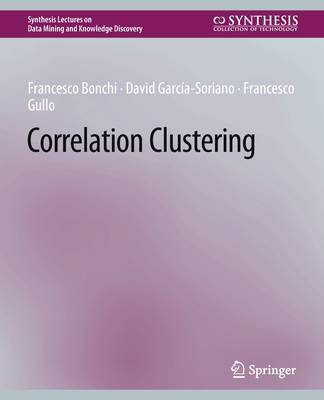
- Afhalen na 1 uur in een winkel met voorraad
- Gratis thuislevering in België vanaf € 30
- Ruim aanbod met 7 miljoen producten
- Afhalen na 1 uur in een winkel met voorraad
- Gratis thuislevering in België vanaf € 30
- Ruim aanbod met 7 miljoen producten
Zoeken
€ 63,45
+ 126 punten
Uitvoering
Omschrijving
Given a set of objects and a pairwise similarity measure between them, the goal of correlation clustering is to partition the objects in a set of clusters to maximize the similarity of the objects within the same cluster and minimize the similarity of the objects in different clusters. In most of the variants of correlation clustering, the number of clusters is not a given parameter; instead, the optimal number of clusters is automatically determined. Correlation clustering is perhaps the most natural formulation of clustering: as it just needs a definition of similarity, its broad generality makes it applicable to a wide range of problems in different contexts, and, particularly, makes it naturally suitable to clustering structured objects for which feature vectors can be difficult to obtain. Despite its simplicity, generality, and wide applicability, correlation clustering has so far received much more attention from an algorithmic-theory perspective than from the data-mining community. The goal of this lecture is to show how correlation clustering can be a powerful addition to the toolkit of a data-mining researcher and practitioner, and to encourage further research in the area.
Specificaties
Betrokkenen
- Auteur(s):
- Uitgeverij:
Inhoud
- Aantal bladzijden:
- 133
- Taal:
- Engels
- Reeks:
Eigenschappen
- Productcode (EAN):
- 9783031791987
- Verschijningsdatum:
- 8/03/2022
- Uitvoering:
- Paperback
- Formaat:
- Trade paperback (VS)
- Afmetingen:
- 190 mm x 235 mm
- Gewicht:
- 272 g

Alleen bij Standaard Boekhandel
+ 126 punten op je klantenkaart van Standaard Boekhandel
Beoordelingen
We publiceren alleen reviews die voldoen aan de voorwaarden voor reviews. Bekijk onze voorwaarden voor reviews.











